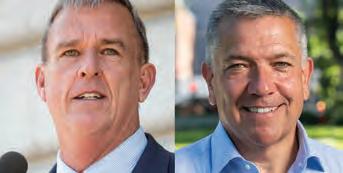




by Matthew S. Bajko
Ain San Francisco has hired a former board
ber to be its first transgender male executive director. Morey Riordan will begin in his position with Openhouse next month.
Interim Executive

Director Vinny Eng will remain on staff for a “short” transition period once Riordan starts September 16. Eng, who had been a co-chair of Openhouse’s board, took over leading the agency on a temporary basis last November following the departure of former executive director Kathleen Sullivan, Ph.D., in October last year.
“I think the organization is poised to write a significant new chapter with Morey at the helm,” Eng, who is gay and queer, told the Bay Area Reporter in a brief phone interview Monday shortly after the hiring of Riordan had been announced. “I am delighted and excited to welcome Morey back home.”
Eng served with Riordan for several months on the board of directors in 2022 after joining it in July that year. Riordan spent six years on the Openhouse board from 2017 to 2022 and was one of more than 250 candidates vetted by the search firm hired to help with the search process for the executive position.
“As a 63-year-old transgender man, I think a lot about what kinds of support are available to me and my community as we age,” stated Riordan in the news release announcing his hiring. “I’ve wondered where I will be safe, cared for with my unique needs in mind, and treated with dignity and respect as I age. When I first came into the Openhouse community I began to breathe easier – I could see the path forward. This is the kind of support that every LGBTQ+ older adult deserves.”
Speaking to the B.A.R. by phone August 4, Riordan said his hiring “definitely does” feel like a homecoming of sorts. His first involvement with Openhouse was attending its annual Spring Fling fundraisers, which led to his eventual joining its board.
“I felt drawn to this work and this particular organization, having know it so well and known it is really exceptional in terms of a sense of community and really holding up our older adults in our community,” said Riordan, who grew up in Aptos, an unincorporated town in Santa Cruz County. “It felt like a great fit.”
Riordan, who also identifies as queer, lives in Berkeley with his wife, Liz Pearlman. Married seven years and together for a decade, the couple has a 22-year-old trans femme daughter, Cyan, and a 17-year-old cisgender son, Giona.
See page 6 >>
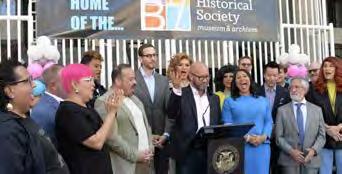
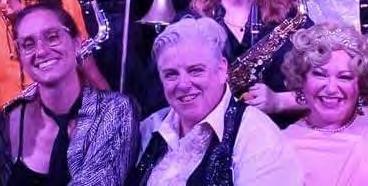

by John Ferrannini
The Castro Halloween festivities resurrected two years ago will be changing tact this year, hoping to revive the spirit of the longdormant street parties. This year, plans call for a celebration of the holiday with an expanded version of the neighborhood’s popular night market on Friday, October 31.
Halloween has had a long, tortured history in San Francisco’s LGBTQ neighborhood and was eventually shut down following violent incidents. In recent years community leaders have attempted a Halloween comeback but at a fraction of the size and shorter duration than the original unofficial street party.
“For the third year running the Civic Joy Fund, in partnership with many Castro neighborhood stakeholders, has worked to reimagine Halloween in the Castro in a way that both nods to what this hallowed tradition was for us but that also reflects what we want it to be,” Manny Yekutiel, a gay man who is executive director of the Civic Joy Fund, stated to the Bay Area Reporter on August 4. Yekutiel added, “Joyous. Safe. Helpful to our small businesses. Welcoming. Growing and investing in the successful Castro night market so that it happens on Halloween Friday is the natural extension of this reimagining. Here’s to new traditions.”
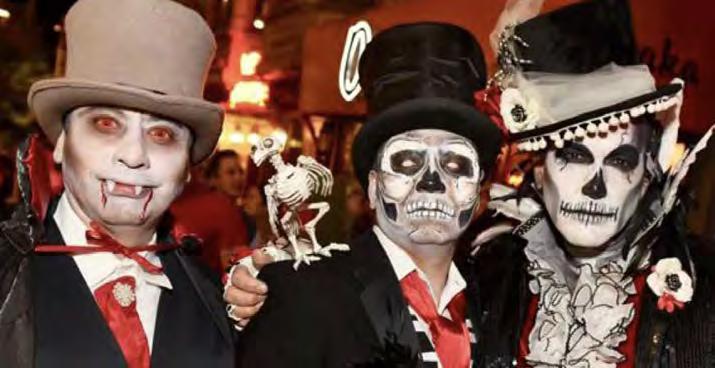


As the B.A.R. previously reported, Yekutiel spearheaded the effort to bring Halloween back to San Francisco’s LGBTQ neighborhood in some form two years ago via storefront activations, a costume contest, and a movie marathon at the Castro Theatre, drawing in Castro denizens such as the Castro Merchants Association and the Sisters of Perpetual Indulgence, a drag nun philanthropic group.




As the Castro and Civic Joy Fund worked to-


by JL Odom
Pgether on burnishing Halloween, the nonprofit also launched a regular installment of its well-attended night markets that take place in neighborhoods around the city in the Castro. The Castro night market has been taking place on the third Friday of each month; with Halloween this year falling on a Friday, the October iteration will be moving to the fifth Friday so that they coincide.




residing over his first official flag raising ceremony for Transgender History Month at San Francisco City Hall, Mayor Daniel Lurie recognized local transgender leaders. Speakers used the occasion to reflect on the city’s past trans activism, acknowledge local organizations that provide support, and honor members of the trans community.
The Los Angeles Blade covers Los Angeles and California news, politics, opinion, arts and entertainment and features national and international coverage from the Blade’s award-winning reporting team. Be part of this exciting publication serving LGBT Los Angeles from the team behind the Washington Blade, the nation’s first LGBT newspaper. From the freeway to the Beltway we’ve got you covered.
“The world, as it always has, is looking to us to be the beacon for the trans community. San Francisco remains steadfast – we will continue to stay true to our history and cherish our trans community for making San Francisco the city we know and love today,” Lurie said at the August 5 event.
Lurie, fellow city leaders, and others gathered on the mayor’s balcony on the second floor of City Hall. It came a little over a month after the freshman mayor was met with heckling from attendees at the annual Trans March in late June that kicked off Pride weekend in San Francisco and shortly thereafter left.
“As the trans flag flies over City Hall, let it remind us of how far we’ve come and how much further we have to go to show up for each other, fight for each other and care for each other,” the mayor said.
Trans activist Jupiter Peraza, who spearheaded

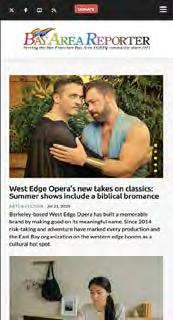
See page 6 >>

Trans leaders who marked the start of Transgender History Month during a flag raising at San Francisco City Hall included, from left, Carlo Gomez Arteaga, co-executive director of the Transgender District; Jenna Rapues, director of Gender Health SF; Honey Mahogany, executive director of the Office of Transgender Initiatives; activist Peaches Banks; Anjali Rimi, board president of the LGBT Asylum Project; and Jupiter Peraza, founder of Trans History Month and member of the transgender initiative office’s Trans Advisory Committee.
the effort to bring Transgender History Month into fruition, said she was interpreting this year’s commemoration “within the context of what we are experiencing as a multifaceted and nonmonolithic community.”
“Many of us cannot afford to remain silent. We must wake up every single day and fight for society to recognize our humanity, not only because we are trans, but because we are also immigrants,” she said.
See page 3 >>

by Eliot Faine
The San Francisco supervisor who represents the Tenderloin has no immediate plans to initiate landmark proceedings on the building that saw an early transgender riot against police back in 1966. The demonstration at Gene Compton’s Cafeteria occurred that summer in August, now recognized by city officials as Transgender History Month.
Today, the building at 111 Taylor Street is owned by Florida-based private prison operator.
It has run a reentry facility for people released from incarceration out of the site for 36 years.
On the building’s ground floor was the 24-hour diner where queer and transgender San Franciscans holed up when they had nowhere else to go. Compton’s was where one night in August 1966 – the exact date is lost to time – a drag queen reportedly threw a cup of hot coffee in the face of the police officer who tried to arrest her without a warrant. This was the cumulation of years of trans and gender-nonconforming patrons facing targeted police violence at the diner, according to “Screaming Queens,” a 2005 documentary about the riot
made by Susan Stryker, Ph.D., a trans academic and professor emerita at University of Arizona. Stryker is now a visiting professor at Stanford’s Clayman Institute.
That act of defiance sparked one of the country’s earliest protests between trans people and San Francisco police. It occurred three years before the better known Stonewall riots in New York City that is credited with the birth of the modern LGBTQ rights movement.
Earlier this year, 111 Taylor Street became the first property granted federal landmark status specifically for its connection to the transgender movement in the U.S. Despite the building’s recognition on both the California and National Register, those classifications don’t offer protection like a city landmark would.
In 2022, the San Francisco Board of Supervisors declared the intersection in front of Compton’s, and the exterior walls of 111 Taylor Street as the city’s 307th landmark. It provides some level of protection to the building facade from being altered.
But the bulk of the structure was not covered by the local landmark. Local historians and preservation planners are concerned this leaves the site vulnerable.




“The city has landmarked only part of [111 Taylor Street]’s facade, leaving the rest unprotected,” Shayne E. Watson, a lesbian and architectural historian and preservation planner at Watson Heritage Consulting, wrote in email correspondence with the Bay Area Reporter. “The rest of the structure isn’t protected under city law. So yes, the building is still at real risk unless the local designation is expanded.”
Watson specializes in LGBTQ+ historic preservation and serves on the advisory board of the Castro LGBTQ Cultural District. She co-wrote a citywide LGBTQ context statement nearly a decade ago that recommended properties like the Compton’s site and others of historical importance to the LGBTQ community be deemed official city landmarks.
District 5 Supervisor Bilal Mahmood, a straight ally, had told the San Francisco Chronicle in May that he planned to introduce a resolution to expand the local landmark so it covered “the entire property in the coming weeks.” Yet, he never did and recently told the B.A.R. that he doesn’t plan to nominate the building as a city landmark just yet.

Instead, the freshman supervisor said his focus is on the GEO Group’s operations at the site. Mahmood spoke at the Board of Appeals hearing on July 16 in support of removing the company from the building, but the city oversight body voted to uphold a letter of determination allowing GEO Group to operate its reentry program there.
Mahmood is now preparing for a public hearing of GEO Group that he called to look into the recent death of Melvin Bulauan, a former resident of 111 Taylor who died about a block away July 14. Bulauan’s family members and members of the Comptons x Coalition have raised allegations of “prison-like” treatment at the company’s reentry facility.

age in the 1950s as a gay man, hiding his true self from his mother and older brother, but finding acceptance from his sister, Wanda “Flip” Walters – a dancer and choreographer – and his father, Walter Lenk, a drummer with the Francis Craig Orchestra.
After a brief time in Santa Barbara, Jack arrived in San Francisco in 1967. He worked for 12 years as a bartender at the late Rikki Streicher’s iconic
“There have been a lot of misunderstandings about the role of preservation. ... The goal is to retain these special places while continuing to help the city flourish around it and with it,” Young said. “In the midst of these state housing laws and upzoning across the city, preservation protections that we have like landmarking … they’re some of the last tools that we have to protect some of our special places.”
An effort to reclaim 111 Taylor Street is being led by local activists, residents, historians, and scholars as the Compton’s x Coalition . Their rallying cry is to “liberate” the site of the GEO Group.
One of the tools of this effort is city landmark designation.
Wilder Zieser of the coalition told the B.A.R. July 24 that individual efforts have been made to “advance the historic landmark designation for years.”
Meanwhile, Stryker said that local landmarks are important.
“Our focus right now is on the hearing, to understand the current status of the facility and assess next steps from there,” Mahmood said in a phone interview with the B.A.R. “We are aligned with the community in trying to get GEO Group out of the Tenderloin and out of [111 Taylor Street].”
Monica Hook, vice president of communications for the GEO Care division, previously stated via email that the GEO Group was not taking questions regarding Bulauan’s death.
But according to Hook’s statement, Bulauan left the facility without authorization on July 13. He was reported and discharged by GEO’s Taylor Street Center. The center was notified on July 15 that Bulauan had died, and it had no additional information.
As for landmarking all of 111 Taylor Street, Mahmood told the B.A.R. he has not ruled it out. After the upcoming subpoena hearing, he said, “Anything is on the table,” and that he will look to the results of the hearing for “the best path forward.”
The date for the GEO Group hearing is not yet confirmed, but Mahmood anticipates it will take place in October.
Landmarking offers some protections
A city designated landmark affords safeguards under Article 10 of the San Francisco Planning Code, which declares the protection and perpetuity of culturally significant sites.
Though, with the recently approved demolition of San Francisco’s No. 299 landmark to make way for a high-rise and a new fire station, there is trepidation regarding the strength of those protections among preservationists.
Kerri Young, programs and communications director at San Francisco Heritage, told the B.A.R. in a phone interview that it’s been a “bad year for preservation.”
Castro bars. In June, Jack spent time with the new owners of Rikki’s, Sara Yergovich and Danielle Thoe, sharing stories – including how he famously had to escort Janis Joplin from the bar on more than one occasion. He continued working in food retail for the next five decades.
In later years, Jack discovered a passion for long-distance running, completing numerous marathons – including the Boston Marathon twice. He was also a devoted supporter of the San Francisco Opera and San Francisco Symphony, where music became one of his lifelong joys.
Though Jack often described himself as a loner, he built a chosen family among the neighbors and friends at Diamond Heights Village, who surrounded him with care as his health declined. A lifelong animal lover, Jack was especially devoted to his dog Lola-Mae, a long haired Havanese.
“Achieving a city historic landmark designation can help bring underappreciated events in a minority community’s history into greater public awareness, and hopefully lead to greater appreciation of diversity that actually exists but might otherwise remain unknown,” Stryker stated in an email to the B.A.R.
Jupiter Peraza, a trans woman who is a Compton’s x Coalition legislative research committee member, said that Mahmood’s plans are responsive to the community’s needs.
“As of now, [city landmarking] is still in the works. We also acknowledge that there are things that have come up in our journey to liberate the building,” she told the B.A.R. July 31, referring to the death of Bulauan.
“I think that the redesignation falls in a celebratory mood that doesn’t really reflect where we are now with the building,” Peraza added
Peraza also praised Mahmood and his office for taking direction from the Tenderloin community.
“It’s been great to collaborate with Supervisor Mahmood’s office,” said Peraza. “They are great partners, and they truly understand the vision of what we are trying to do in honoring transgender and queer history of the Tenderloin, specifically at 111 Taylor.”
The landmark process can be initiated by anybody, including community members. But, if the process is initiated by a supervisor, the city’s Planning Department and its Historic Preservation Commission have 90 days to take up the matter and hold a public hearing on it.
Following the oversight body’s vote on the landmark request, the supervisors then take it up to take final action on the matter. They do not need the property owner’s support to approve the landmark, as explained by city planners in a guide about the local landmarking process.t
Jack served as HOA president for many years and was instrumental in upgrading the community landscaping – a vibrant, Zen-influenced mix of trees, cascading ponds, and ground cover that continues to draw admiration.
Per his wishes, Jack’s ashes will be scattered in San Francisco Bay, alongside the ashes of his cherished pets: Baby Fawnie, Poco (1984), Alfie (1993), Beauregard (1996), Miss Kittie (2004), Sister Sassy (2007), Mama Sophie (2013), Brother Bob (2022), and Lola-Mae (2024).
A gathering of remembrance will be held this fall in the Diamond Heights Village Center Courtyard, the landscaping of which was largely Jack’s creation, honoring the friends and neighbors who cared so deeply for him over the years. For information, email charlie@ parknorth.com.
by John Ferrannini
The San Francisco Police Department’s Mission Station has a new captain in Sean Perdomo.
The department made the announcement via Facebook and Instagram July 17, and he started earlier this week, according to SFPD Captain Christopher Del Gandio, the first out gay SFPD captain and the co-chairperson of the SFPD LGBTQ+ Forum. The forum members learned of Perdomo’s promotion at their meeting July 30 at UCSF Mission Bay.
A department spokesperson confirmed the news late July 30, but as of press time July 31 hasn’t returned an email seeking additional information. The website for Mission Station at already has been updated to reflect Perdomo being named its captain as well as of the Field Operations Bureau, MidCity Division. It includes a note that his “Biography coming soon!”
On another issue, forum members had not heard about recent incidents of men being allegedly drugged by two women and then discovered to be missing thousands of dollars. One incident took place after a gay man met the women while at the Mix bar in the Castro.
The forum also heard from a gay 911 operator.
As the B.A.R. previously reported, Captain Liza Johansen departed the role earlier this summer after less than a year, making her the fifth Mission Station captain in four years responsible for the station, which covers much of San Francisco’s LGBTQ Castro neighborhood.
A KPIX-TV report from February 2024 stated that Perdomo had been assisting with training a large new class of officers at the police academy. He formally was captain of the Police Academy and is a former treasurer of the San Francisco Police Officers Association.
Two years ago, Perdomo was involved in the department’s creating guidance on police foot chases. As he told the city’s Police Commission, “Something that you learn, as you become a more senior officer, is weighing the costs and benefits of chasing after somebody.”
A 2017 report in the San Francisco Examiner called him a “top scorer” in the officer exam. It stated he was “A sergeant with a record of aggressive policing, according to news reports and department sources. For instance, a man was acquitted in a case that involved Perdomo tackling him and falsely identifying him as a suspect in a drug-dealing case. But Perdomo is also known for putting away a man who was posing as a police officer and sexually assaulting Latino men.”
Between Johansen’s tenure and Perdomo’s start on the job, Mission Station was led temporarily by Manny Bonilla, who spoke at a July 10 public safety forum in the Castro. That meeting garnered headlines after SFPD Deputy Chief Derrick Lew made comments about officers protecting federal immigration enforcement. Those remarks rankled queer District 9 Supervisor Jackie Fielder, who sent a letter of in-
<< Trans leaders
From page 1
Peraza, a trans woman and Deferred Action for Childhood Arrivals recipient, moved from Sanora, Mexico to San Francisco 10 years ago to attend San Francisco State University. She’s on the Office of Trans Initiatives’ Trans Advisory Committee and LGBTQ senior service provider Openhouse’s manager of statewide coalition.
“No piece of legislation will ever strip us of our truth. No amount of policing will extinguish the eternal flame of our trans identity within.
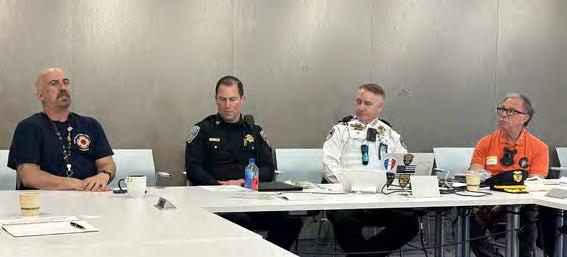
Ron Davis of the Department of Emergency Management, left, spoke at the SFPD LGBTQ+ Forum July 30 at UCSF Mission Bay, where he was joined by SFPD Captain Christopher Del Gandio; and Ken Craig and Greg Carey, both of Castro Community on Patrol.
quiry seeking information from the department about its policies. She later gathered the support of enough city supervisors to pass a nonbinding resolution asking the department to come up with policies about interacting with ICE.
Del Gandio said during the forum that the SFPD doesn’t cooperate with ICE, due to the city’s current sanctuary ordinance.
Ron Davis, a gay man who works at the Department of Emergency Management, where he answers 911 calls, encouraged anyone no matter their immigration status who feels they need emergency services to call 911.
“If you’re the victim of a crime, a heinous crime, we’re not going to report you to immigration,” he said. “My department has no contact with immigration on a regular basis. … I get a lot of calls for people who are calling for an undocumented person because they are afraid to call. Please let them know this is a sanctuary city as far as police are concerned. We offer no judgment. It’s not our place.”
On the subject of captain turnover at district stations, District 5 Supervisor Bilal Mahmood, a straight ally, recently sent a letter of inquiry to the SFPD to try to ascertain how frequently captains are rotated out of precincts. In District 5, covering the Tenderloin and Haight Ashbury neighborhoods, five captains were lost across three stations this year alone, according to Mahmood’s letter. Specifically, it inquires, “Over the past five years, how often have captains been reassigned or replaced at each SFPD district station?” as well as “Does the Department track the reasons for captain turnover in a centralized or formal way? Are exit interviews conducted? If so, can this data be shared?” and “Are there any strategies or incentives currently in place to promote longer captain tenures at a single station?”
An SFPD spokesperson hasn’t returned the B.A.R.’s requests for comment about either letter.
Del Gandio said that one way the department is trying to promote consistent communication between the police stations and the communities they serve, in spite of turnover, is by establishing new liaisons. As the San Francisco Chronicle reported, Lieutenant Christina Serrano will be a liaison to the Spanish-speaking community out of Mission Station, and Lieutenant Kin Lee will be a liaison to the Cantonese-speaking community out of
Nurture that flame,” Peraza told the crowd. “Build your power in your pride, because they might take everything, but they would never be able to take away that.”
This year marks the fifth annual Transgender History Month in San Francisco. Following then-mayor London Breed’s signing of the firstof-its-kind proclamation for the city on August 24, 2021, August was later proclaimed Transgender History Month in the state of California in September 2023, and first officially recognized in 2024, as the Bay Area Reporter previously reported
See page 6 >>
new members, particularly from trans and women communities, and neighborhoods other than the Castro.
“If there’s anyone you know out in the community who might make a good fit, especially more diverse communities, more female, we encourage them to apply” to join, he said. The forum can be reached at the email address sfpd.lgbtq. forum@gmail.com
911 operator discusses emergency calls
Davis, the 911 operator, was the featured speaker at the forum.
Central Station, covering Chinatown.
“I think Mission and Central are the busiest when it comes to events and community meetings, and what have you,” Del Gandio said. “As you can see, Mission Station goes through captains pretty quickly, because there’s so much demand. … Captains get promoted out of those stations, they’re there for a year then they are promoted to command staff, and that’s one of the basic complaints of residents. This will provide a little continuity – the captain may have gotten promoted, but the lieutenant is still here.”
Del Gandio confirmed that the SFPD LGBTQ+ Forum will continue to meet even as the department does not have a permanent chief; Paul Yep is interim chief following the departure of longtime chief Willaim Scott in June.
Alleged drugging incidents
Del Gandio and other forum members, who are civilians, had not heard of two recent reported cases of women allegedly drugging men they met at San Francisco bars with what they said was cocaine before stealing thousands of dollars.
The first case was reported by a gay man who said he met the women at The Mix, and the second case was reported by a straight man who said he met the women at a North Beach bar.
Greg Carey, a gay man who is chair of Castro Community on Patrol, said that when the volunteer neighborhood safety group started, druggings were “kind of common.”
“That was happening in bars where younger people were roofie-ing older men and when they were suddenly feeling ill, they’d volunteer to help them get home safely, then they’d rob them,” Carey said. “One of the reasons we had 100 volunteers at one point.”
Carey and Ken Craig, also of Castro patrol, said that the forum – which meets four times a year – is looking for
San Francisco’s 911 system incorporates calls that are then sent to the appropriate city department – whether that be police, sheriff, fire, medical, or the street crisis response teams, Davis said. When a call is sent to police, the call is sent to one of five “talking groups,” which are comprised of two dispatchers each.
Davis said the city’s 911 system has become ever more strained.
“When I started in 2001 we only did police – we did, on average, 1,500 calls a day, and we weren’t doing cell calls,” he said. “We had 115 people. I know because I was two from the bottom of the sign-up sheet [for shifts.] … The current sign up, we have 114 people on it, and we do anywhere from between 3,500 to
4,000 calls a day. On weekends, it goes above 4,000. We do police, fire, medical, and sheriff, and we take those calls and you mix in the difficulty of triaging medical calls, which is longer, so even if there’s less calls you’d be adding volume to the time it takes to phone in a call.”
Davis said that, “Mayor [Daniel] Lurie seems to have put a priority on seeing” more callers are hired, “but it’s a hard job and people burn out quickly.” Davis has worked 25 years in San Francisco.
He praised the street crisis response teams, saying it has helped lessen the burden on the police and other departments.
“At first we thought it was a bunch of nonsense, but it actually works,” he said. “I hope they keep expanding it.”
Calls have to meet certain requirements to be routed to street crisis response.
“You see a person on the street and think they need service? Did you ask? Did he say [he wanted service]? Is he in any way in distress?” Davis asked, giving questions 911 operators will want to know. “If you see a person down, did you just see him over there?”
He said when “life status is questionable,” the paramedics are called.
“Street crisis response is a godsend for us,” he said. t

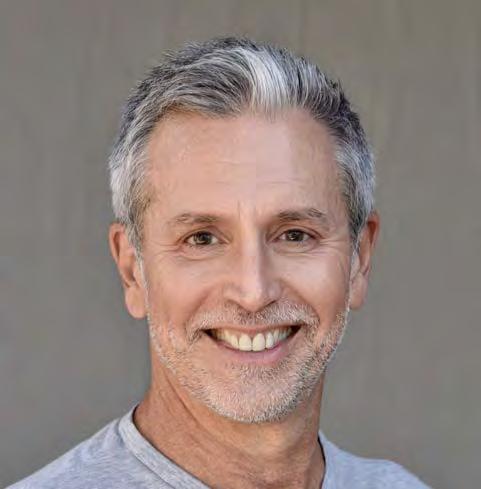



Volume 55, Number 32
August 7-13, 2025 www.ebar.com
PUBLISHER
Michael M. Yamashita
Thomas E. Horn, Publisher Emeritus (2013)
Publisher (2003 – 2013)
Bob Ross, Founder (1971 – 2003)
NEWS EDITOR
Cynthia Laird
ARTS & NIGHTLIFE EDITOR
Jim Provenzano
ASSISTANT EDITORS
Matthew S. Bajko • John Ferrannini
CONTRIBUTING WRITERS
Christopher J. Beale • Robert Brokl
Brian Bromberger • Philip Campbell
Heather Cassell • Eliot Faine
Michael Flanagan • Jim Gladstone
Liz Highleyman • Brandon Judell • Lisa Keen
Philip Mayard • Laura Moreno
David-Elijah Nahmod • Mark William Norby
JL Odom • Paul Parish • Tim Pfaff
Jim Piechota • Adam Sandel
Jason Serinus • Gregg Shapiro
Gwendolyn Smith • Charlie Wagner
Ed Walsh • Cornelius Washington • Sura Wood
ART DIRECTION
Max Leger
PRODUCTION/DESIGN
Ernesto Sopprani
PHOTOGRAPHERS
Jane Philomen Cleland
Rick Gerharter • Gooch
Jose A. Guzman-Colon • Rudy K. Lawidjaja
Georg Lester • Rich Stadtmiller
Christopher Robledo • Fred Rowe
Shot in the City • Steven Underhill • Bill Wilson
ILLUSTRATORS & CARTOONISTS
Christine Smith
VICE PRESIDENT OF ADVERTISING
Scott Wazlowski – 415.829.8937
NATIONAL ADVERTISING REPRESENTATIVE


by Matt Dorsey
San Francisco currently prohibits a growing majority of businesses from competing for the $5.8 billion in taxpayer dollars we annually spend on city goods and services contracts.
The reason?
Because since marriage equality for same-sex couples became the law of the land a decade ago, fewer and fewer employers still offer the domestic partner benefits that our 1996 equal benefits ordinance, or EBO, still requires to become a qualified city bidder.
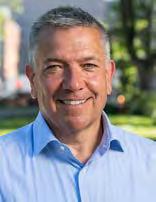
That makes our competitive bidding less and less competitive – and our goods and services more and more expensive.
This phenomenon isn’t hypothetical. Last year, our City Administrator reported that 46% of city bid solicitations issued the year prior received one response or no response. In this time of persistent city budget challenges, our self-imposed, social-policy-driven, wholly discretionary obstacles to competitive bidding aren’t just reducing competition – they’re helping eliminate it completely in nearly half of all cases.
The result?
San Francisco taxpayers must increasingly pay top dollar for goods and services contracts, which today account for more than one-third of our entire $16 billion municipal budget.
The EBO isn’t alone among San Francisco’s social policy requirements to which prospective contractors must adhere, of course. But it is different. Unlike other 1980s- and 1990s-era, largely symbolic contracting mandates, the EBO is by far the most onerous, costly, and labor-intensive to administer. It is also the only social policy mandate for which prospective city contractors must first earn certification even to qualify as a supplier. And among steps listed on our city’s “Become a City Supplier” webpage that can take anywhere between “a few minutes” and “a few days” to complete, only the EBO can take up to “a few weeks.”
As a gay man myself, who spent the better part of 30 years fighting for LGBTQ+ equality and marriage rights, I’d be the first to concede that – even with its added expense and bureaucratic burdens – our EBO’s strict bidding prohibitions once made sense. For years, when
same-sex couples were legally denied access to marriage rights, domestic partnerships were the only chance LGBTQ+ partners had to get workplace benefits equal to those of heterosexual couples. That’s why domestic partnerships were a core LGBTQ+ priority for decades. It’s also why, in its day, San Francisco’s equal benefits ordinance was important: It highlighted the profound unfairness of marriage discrimination; and expanded access to health care and other benefits for countless LGBTQ+ couples; It helped drive corporate-sector adoption of domestic partner benefits, reaching its zenith in 2014 with 67% of Fortune 500 companies; and
It set the stage for landmark U.S. Supreme Court rulings that ultimately struck down California’s Proposition 8 in 2013 (Perry) and won marriage equality nationwide in 2015 (Obergefell).
That 2015 U.S. Supreme Court decision securing equal marriage rights for same-sex couples, of course, wholly eliminated the LGBTQ+ equality principle that long underpinned domestic partnerships. And not surprisingly, the number of businesses offering those benefits quickly declined. A survey of workplace benefits at the time found that employers providing domestic partner benefits dropped from 59% in 2014 (the year before Obergefell) to 48% in 2016 (the year after).
More recently, a Kaiser Family Foundation 2023 Employer Health Benefits Survey found that only 45% of large U.S. businesses now offer domestic partner benefits – with only 38% of small- and mediumsized businesses still offering them.
It’s time to acknowledge some truths about the EBO:
If its objective was to secure equal benefits for LGBTQ+ couples, then the EBO succeeded admirably in helping win same-sex marriage rights 10 years ago;
If, however, its objective was simply to grow domestic partnership benefits for domestic partnerships’ sake, it has been failing abysmally for the last 10 years.
Either way, responsible governance demands that we fully and honestly assess the current financial impacts of EBO’s strict prohibitions, which bar a growing majority of large businesses – and an overwhelm-
ing majority of small and medium businesses – from competing for our goods and services contracts. That’s why I last week requested that the city’s Budget and Legislative Analyst, or BLA, estimate potential cost-savings San Francisco might reasonably expect: if we expand eligibility for competitive bidding to fully 100% of businesses; and if we eliminate the myriad direct costs to city agencies for EBO qualification, enforcement, and compliance.
Have EBO’s contracting prohibitions outlived their usefulness? I’d argue yes. Should we repeal the EBO outright? I’d argue no.
Given uncertainties around the Trump administration and this Supreme Court, a more prudent legislative approach would halt enforcement – thereby restoring competition to our competitive bidding – with a hair-trigger provision to enforce the EBO immediately for new contracts if LGBTQ+ marriage rights were ever overturned.
While I respectfully disagree with those arguing that the EBO is worth keeping at any price, the worst argument I’ve heard for continuing EBO’s enforcement is that our collective fear of President Donald Trump should cause Democrats to hit the pause button on good government reform.
That’s spineless. And we need to do the exact opposite. Now more than ever, those of us responsible for governing Democratic-led cities must lead with courage and urgency to fix our problems and make government work better, more efficiently, and more cost-effectively.
San Francisco’s city government has many structural problems to solve in the years ahead. Doing so will take political bravery to scrutinize our sacred cows, and to ask tough but necessary questions if they’re not needed anymore. EBO is one such sacred cow, and nostalgia for what it once meant to our LGBTQ+ movement isn’t a good enough reason to enforce it – not if it’s found to be needlessly costing millions.
Let’s see what the forthcoming BLA report shows. Then, let’s act thoughtfully and responsibly based on the facts. We owe San Francisco taxpayers nothing less.t
San Francisco Supervisor Matt Dorsey, a gay man, represents District 6 and serves as vice chair of the Board of Supervisors’ Budget and Finance Committee.
by Jeff Sheehy
For the first time I can remember, the LGBTQ+ community does not have a champion in San Francisco City Hall.

It’s stunning that the landmark equal benefits ordinance, or EBO, is on the chopping block and none of the supervisors from our community have stepped up to stop the destruction of this hardwon law. Even worse, not only is gay District 6 Supervisor Matt Dorsey leading the charge and gay board President Rafael Mandelman is non-committal, but the rationale for this change is that giving up our rights will save money. Freedom is not free. Have we forgotten that the fight for our rights cost Harvey Milk his life?
Dorsey’s cost justifications are embarrassingly laughable. He suggests in the San Francisco Chronicle that $290 million in savings for the city are on the table. Seriously? And one thing I find odd is that we have not heard from City Administrator Carmen Chu, who is responsible for city contracting and actually manages the enforcement of the EBO. In 2017, we had an event in City Hall commemorating the 20th anniversary of the EBO, which went into effect in 1997 after being passed and signed in late 1996. Then-city administrator Naomi Kelly was one of the featured speakers and spoke glowingly of the measure and the positive impact of its implementation. This would have been the time for her to say that this law was an impediment to city contracting and/or that it was too costly to continue. I note that this event was two years after the 2015 U.S. Supreme Court’s Obergefell decision upholding same-sex marriage, which Dorsey cites as a reason to eliminate this law.
In the Bay Area Reporter, Dorsey talks about his inability in 2005 to contract with a vendor of an early version of a Zoom-like web conferencing app while he was the city attorney’s flack. By that time, the law had led to major companies like AT&T, Chevron, Wells Fargo, Bank of America, and all major airlines, among others, providing spousal benefits for countless lesbians and gay men. The State of California, Los Angeles, San Diego, Seattle, and Minneapolis, to name a few, had passed similar laws. Too bad the EBO existed and it inconvenienced Dorsey. Aargh!!!
The EBO did not emerge out of thin air and took enormous efforts to defend. Its champions are a gal-
lery of LGBTQ+ and straight ally superstars. Geoff Kors, a gay man who went on to lead Equality California and was mayor of Palm Springs, conceived the measure. Lesbian activist Carol Stuart drafted the legislation.
Gay former supervisor Tom Ammiano sponsored it and, with the support of lesbian former supervisors Susan Leal and Leslie Katz, worked it through the board and supported its implementation and defense. Then-mayor Willie Brown enthusiastically signed the law.
Former city attorney Louise Renne put her ace deputy attorney, Dennis Aftergut, in charge of defending the law after it was challenged by United Airlines and the airline industry. Aftergut recruited lesbian attorney Therese Stewart to the case.
Stewart later led the city’s defense of same-sex marriage under then-city attorney Dennis Herrera. (Stewart is now a presiding justice on the California Court of Appeal.) As an aside, Herrera, Dorsey’s boss when he was inconvenienced, used to say there were two key factors in his first, very close election as city attorney, one of which was the LGBTQ+ community. This was due in no small part to Herrera’s pledge (which he kept) to vigorously support the EBO and to continue to lead in fighting for our rights. On the other hand, his opponent, who had lapped him in the first round, was outed by the B.A.R. during the runoff for taking contributions from boycotted United Airlines.
The successful boycott of United Airlines was pivotal in defending the legislation and the eventual decision by all major airlines to offer spousal benefits to all domestic partners of employees in 1999. United ticket offices (few may remember that airlines had a number of actual offices where physical tickets were purchased) were picketed and shut down in acts of civil disobedience with ensuing arrests. The takeover by a team of Tinky Winkys, the purported gay children’s TV characters from the Teletubbies, included the late rainbow flag co-creator Gilbert Baker. Obviously, it was not Baker’s first arrest, and as a seamstress extraordinaire, his contribution also included sewing the costumes.
Stan Kiino, a gay man and United flight attendant, helped organize lesbian and gay employees from United, whose depositions of the harms they had suffered from not having spousal benefits were crucial

in the legal defense of the law. Kiino was also a labor activist who went on to lead Pride at Work, the AFL-CIO’s LGBTQ+ group.
The late ACT UP leader and activist Jeff Getty produced and directed an anti-United Airlines commercial that we managed to get funding to air in Los Angeles and Houston. Getty, who had undergone a dangerous stem cell transplant from a primate immune to HIV infection in 1995 – leading to organ transplants for people with HIV and providing the template for the stem cell-based cures that have taken place since – died in 2006.
When Peter Tatchell, the gay Australian-born British human rights activist, led his group, Outrage, in support, the boycott of United Airlines went international.
One of the big concerns with the law was the fear that gay men with AIDS would cost companies big bucks. In 1996, when the law was passed, antiretroviral therapies, aka “drug cocktails,” were just emerging. We saw the Lazarus effect – people with AIDS on their deathbeds were restored to health.
I was diagnosed with HIV in 1997 and did not have insurance. If I had not lived in San Francisco, with its historic model of care implemented by the Department of Public Health, and in California, with its fully funded AIDS Drug Assistance Program, I would be dead. As Dorsey has recounted, I was the first person he called when he was diagnosed. I helped him navigate the process of getting care and dealing with his diagnosis. I assured him he would live. Of course, he had insurance. It is striking that Dorsey wants to undo this law that has provided health care to so many at a time when Medicaid and subsidies for Obamacare are being cut, putting health insurance out of the reach of millions.
Many people, LGBTQ+ and straight, opt for domestic partnership. My favorite soap opera, “General Hospital,” even had a storyline recently about a heterosexual couple opting to enter into a domestic partnership. Marriage does not have to be enough –and it is not enough with several U.S. Supreme Court Justices determined to end it for same-sex couples.t
Jeff Sheehy, a gay man, is a former San Francisco District 8 supervisor. He helped with the creation of the equal benefit ordinance and led the boycott of United Airlines.
by Matthew S. Bajko
With talks dragging on between San Francisco officials and the GLBT Historical Society over the lease for a new LGBTQ museum in the city’s Castro neighborhood, the delay is raising concerns about a looming deadline for the project to tap into $5.5 million in state funding for it. Currently, those funds are to be used by next summer.
Now, gay state Senator Scott Wiener (D-San Francisco) aims to extend that deadline to the end of 2027. He had initially secured the state funds for the museum project in 2022, and as chair of the Senate Budget Committee, had inserted language into California’s 2025 state budget to roll over the unused funds to next year.
“The money is there and ready to be used. It does have a deadline of next year,” Wiener told the Bay Area Reporter in a recent phone interview.
That deadline is June 30. But after hearing from gay San Francisco Board of Supervisors President Rafael Mandelman with concerns of seeing the city meet that date, Wiener now plans to include extending it by 18 months in the budget trailer bills to be taken up by state legislators in the coming weeks. Those need to be passed by mid-September when the legislative session ends.
“It looks like they could use an extension, which is something I support and will try to get that done in the budget cleanup that the Legislature needs to do each year,” said Wiener, adding that he “would support extending it to the end of 2027 to give them plenty of time to get it done.”
Mandelman told the B.A.R. in light of the current 2026 deadline, “We probably need a longer runway than that.”
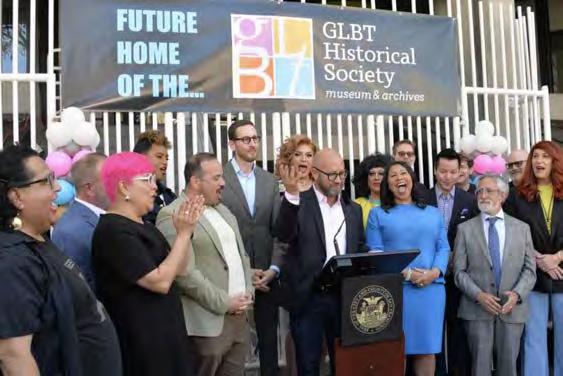
ditional money raised by the nonprofit via a capital campaign.
The current tenants of the building’s ground floor commercial spaces are to move out when their leases expire, with the expectation that the historical society will expand into them to become the sole occupant. Barry’s Bootcamp is subleasing its storefront from CVS and can remain through 2040, while UCSF Health-GoHealth Urgent Care has a lease for its clinic through 2036.

Any change to the budget language in the fiscal bills that Governor Gavin Newsom signed into law in late June requires agreement between the governor’s office and the Legislature’s two chambers, noted Wiener, who cautioned those talks are “complicated.” He added, “You are never guaranteed success” when it comes to the budget, so demurred when asked how confident he was of securing the extension for the museum funds.
As the B.A.R. was first to report last September, the administration of former mayor London Breed bought the Market & Noe Center at 2280 Market Street for $11.6 million to serve as the permanent home for the GLBT Historical Society’s museum and archival center. It brought to an end a two-decades-long search for a suitable site for the museum, which for years has been housed in leased storefronts on 18th Street in the heart of the LGBTQ Castro district, while its archives are housed in rented space downtown along with its staff offices.
As part of the deal to purchase the two-story commercial building for the archival preservation nonprofit, the city’s Real Estate Division was given oversight of the property while working out a lease agreement with the historical society and the Community Arts Stabilization Trust. Known as CAST, the community-centered, arts and culture focused real estate organization works to secure and steward affordable spaces for nonprofit arts and culture organizations in San Francisco.
CAST was announced as the prospective property manager until such time that the LGBTQ nonprofit was able to take full control of the prominent corner structure at a main entry point into the historic Duboce Triangle neighborhood that borders the Castro. The plan is for the historical society to first move into the vacant second floor, with build out of the space for its museum installations to be covered by the state funds and ad-
Under terms announced last year by city officials, the city was to retain 10% of the monthly $58,000 in lease payments from the commercial tenants and put the rest of the money into a separate reserve account to be used by the historical society for capital improvements and possibly programming. It had been thought CAST would be the master leaseholder and enter into a sublease with the historical society while receiving 10% of the lease payments for taking on the property manager role from the city.
But since the announcement from last September the historical society is now planned to be the master leaseholder and the city will enter into a contract with CAST to serve solely in a property management and asset management role, helping to train staff with the archival group to perform such functions in the future. CAST’s fee for doing so is expected to be 10% of the total gross revenues for the building, which would cover any lease payments made by the historical society in addition to the two commercial tenants.
The city’s long-term goal is to eventually transfer ownership of the property to the GLBT Historical Society. It had been anticipated that the lease agreement would have been introduced to the Board of Supervisors for approval by mid-2025.
When asked for comment about the lease status, a spokesperson for Mayor Daniel Lurie declined since the process is ongoing and referred the B.A.R. to the city’s Real Estate Division, which recently welcomed Sally Oerth as the new director of real estate. It now is eying having the lease finalized by late 2025, and due to the ongoing negotiations, the division declined the B.A.R.’s interview request when asked in late July for an update.
In a statement, the division housed within the City Administrator’s office told the B.A.R. it “is in active negotiations to lease space for the LGBTQ Museum. We have been working in close partnership with Mayor Lurie and President Mandelman’s offices. We are aware of the deadline for state funding and believe we are headed in a direction to have a lease by the end of the year.”
With the supervisors now on their summer recess until September 2, the board would not be able to take up voting on the lease until October at the earliest. It would first need to be officially introduced, which normally
prompts a 30-day timeline to be sched uled for a hearing before one of the su pervisor’s committees. Once the panel assigned to review the lease votes on the matter, then it will go before the full board for final adoption.
“I am of the opinion we can get something introduced in September,” Mandelman told the B.A.R. in late July ahead of his annual summer pilgrim age to the LGBTQ travel destination of Provincetown on the tip of Cape Cod in Massachusetts.

As for the delay in being able to do so, Mandelman said, “I think it is complicated on both the city’s side and the historical society’s side on exactly how this is going to work. I think there is some clarity and people are rowing in the same direction, and I just think we need to pick up the pace.”
CAST Managing Director of Real Estate Carolyn Choy told the B.A.R. in an August 1 phone interview that she is confident the lease talks will wrap up in the coming weeks and be finalized by year’s end. It has experience working out such an agreement with the city, as CAST is the master leaseholder for San Francisco Recreation & Parks Department’s historic Geneva Car Barn and Powerhouse building in the Excelsior neighborhood and subleases with the nonprofit Performing Arts Workshop to operate it as a neighborhood arts center.
“I think we all have been diligently working on this since the spring and are continuing to work together to push this forward. We all want the same outcome,” said Choy, adding that, “we would love to do this by the timeline Supervisor Mandelman described.”
Gay GLBT Historical Society Ex ecutive Director Roberto Ordeña na told the B.A.R. he “is confident” of seeing the lease negotiations wrap up in the coming months. He said the negotiations “are moving along” and his organization expects to be able to gain access to the new museum site by early 2026.
“I really appreciate that the Real Estate Division is leading this, but also members of Mayor Lurie’s administration and Supervisor Mandelman are all working really hard with us to get to a lease,” said Ordeñana. “We are really confident that is going to materialize in the fall or by the end of this year. We are really looking to the moment when we have site control so we can begin to test out all of our assumptions on how much is it going to cost to renovate the space then begin the design and build out process.”



Until then, the historical society is uncertain of the price tag for the renovations and how much it will need to raise in addition to the state funds allocated toward the project. No matter the cost, the nonprofit is planning to launch a capital campaign sometime in 2026 to raise additional funds to help pay for moving into the new space as well as ongoing programming and other needs.
DEADLINES: Friday 12 noon for space reservations Monday 12 noon for copy & images
TO PLACE: Call 415 829 8937 or email us at advertising@ebar.com *Non-display Obituaries of 200-words or less are FREE to place. Please email obituary@ebar.com for more information.

Openhouse’s hiring of Riordan comes as the trans community has come under fierce attack by the Trump administration and Republican-controlled statehouses across the U.S. Riordan told the B.A.R. he wants to serve as a role model to trans and gender-nonconforming youth in particular that no matter your gender identity you can find success and potentially one day lead a high-profile service provider like himself.
“I think this is a time when trans voices are really important to be heard weighing in on issues directly impacting our rights and our wellbeing and health. I plan to be really clear about that and I know that is important to Openhouse,” said Riordan. “Obviously, a lot of time the trans community feels like the bullseye on the dart board. Frankly, the LGBTQ community more broadly has been under some attack; I am not sure that is going to change anytime soon. I bring that broader lens, as well, because we are in this together.”
He has been serving as a board member for the National Center for LGBTQ Rights, formerly known as the National Center for Lesbian Rights until changing its name earlier this year. According to his board bio, Riordan currently serves as the CEO of Mind Share Partners, an organization dedicated to changing the culture of workplace mental health.
He is the founding director of the Transgender Strategy Center, which provides capacity building and grantmaking to trans and gender-noncon-
Halloween
From page 1
And due to new state laws, Senate Bill 76 in 2023 and SB 969 in 2024, introduced by Castro resident gay state Senator Scott Wiener (D-San Francisco), and city ordinances, bars in the footprint of the night market –and other entertainment zones in San Francisco – can sell alcohol for outdoor consumption.
Wiener stated to the B.A.R. that, “The Castro night market is a huge success for the neighborhood, and pairing it with our Entertainment Zone law makes the night market more fun while supporting our local bars and restaurants. Castro Halloween has been coming back organically in recent years, and it’s been peaceful and festive. I’m optimistic the city can make a Castro Halloween night market a big success.”
Gay Board of Supervisors President Rafael Mandelman, who represents the Castro on the board, told the B.A.R. he did not have thoughts to share as yet, except that, “It strikes me that there will need to be a higher level
The designation honors the Compton’s Cafeteria riot that occurred in August 1966 in the Tenderloin, at the corner of Turk and Taylor streets. The former Gene Compton’s Cafeteria was where one night – the exact date is lost to time – a drag queen reportedly threw a cup of hot coffee in the face of the police officer who tried to arrest her without a warrant. This was the culmination of years of trans and gender-nonconforming patrons facing targeted police violence at the diner, according to “Screaming Queens,” a 2005 documentary about the riot made by Susan Stryker, Ph.D., a trans academic and professor emerita at University of Arizona. Stryker is now a visiting professor at Stanford’s Clayman Institute.
Recent efforts to reclaim the historic site at 111 Taylor Street from its current occupant, the Floridabased private prison operator GEO Group, have been unsuccessful, as the B.A.R. reported. The GEO Group has run a reentry facility for
forming communities throughout the U.S. At the Oakland School for the Arts, Riordan co-chaired the PTA. In 2021, he served as the lifetime achievement grand marshal for the San Francisco LGBTQ Pride parade.
For six years in the 2010s Riordan was vice president of access and innovation for AIDS United, a national HIV advocacy organization. In 1998, he was hired as the executive director of The Sperm Bank of California, a feminist founded nonprofit assisting LGBTQ+ families and individuals with family building.
He graduated Chico State with a B.A. in social work in 1984. Three years later, Riordan earned his Master of Social Work from CSU-Sacramento.
According to his board bio, Riordan currently serves as the CEO of Mind Share Partners, an organization dedicated to changing the culture of workplace mental health. He is the founding director of the Transgender Strategy Center, which provides capacity building and grantmaking to trans and gender-nonconforming communities throughout the U.S.
At the Oakland School for the Arts, Riordan co-chaired the PTA. In 2021, he served as the lifetime achievement grand marshal for the San Francisco LGBTQ Pride parade.
For six years in the 2010s Riordan was vice president of access and innovation for AIDS United, a national HIV advocacy organization. He has a Master of Social Work from California State University, Sacramento and in 1998 had been hired as the executive director of The Sperm Bank of California, a feminist founded nonprofit assisting
of public safety and interdepartmental coordination, so of course it will be important that they be on top of that. I would imagine there would be some additional neighborhood outreach given the history.”
Yekutiel stated it is to be determined whether, as in 2023 and 2024, merchants will receive cash to facilitate activating their storefronts on Halloween night, or whether the night market will suffice as far as Civic Joy Fund’s involvement. (The prior years’ storefront activations were timed to the Saturdays before October 31, not on Halloween proper, as Halloween night fell on weeknights those years.)
CG Events co-founder Chris Carrington, a gay man, has been the point person on organizing the Castro night markets. He told the B.A.R. in an August 4 phone interview that firm plans are still being made.
“We are still working on permitting, so nothing is really confirmed,” Carrington said.
Permits will be needed from the San Francisco Municipal Transportation Agency for street closures, Carrington said, as he hopes an expanded foot-
people released from incarceration out of the site for 36 years.
Earlier this year, 111 Taylor Street became the first property granted federal landmark status specifically for its connection to the transgender movement in the U.S. In 2022, the San Francisco Board of Supervisors declared the intersection in front of Compton’s and the exterior walls of 111 Taylor Street as the city’s 307th landmark.
For Madeleine Lim, executive director of Queer Women of Color Media Arts Project, attending the ceremony was a means to celebrate what the monthlong recognition entails.
“As one of the speakers mentioned, transgender history is American history, and we cannot be erased from the history books,” she said, referring to remarks by Breonna McCree, a woman of trans experience who is co-executive director of the Transgender District.
For Lim, a queer woman of color in her 60s, President Donald Trump’s executive orders directed at LGBTQ individuals, such as “Defending Women from Gender Ideology Extremism and Restoring Biolog-
LGBTQ+ families and individuals with family building.
Eye on sustainability
“I am thrilled to be joining Openhouse,” Riordan stated. “In these uncertain times, I look forward to providing steady and trusted leadership while helping the organization meet this moment strategically. With an eye on sustainability, I am focused on strengthening the collective voice of LGBTQ+ older adults on issues that directly impact their health and well-being.”
Openhouse board Co-Chairs Shireen McSpadden and Mark Buchanan called Riordan “truly the right leader to meet this moment for our community. His lived experience and passionate leadership on the local and national levels will be invaluable as we continue providing the best direct programs and services for our growing LGBTQ+ older adult community.”
McSpadden, a bisexual woman, is executive director of the city’s Department of Homelessness and Supportive Housing. Buchanan, a former longtime employee at tech giant Apple, is the founder and an executive coach of his firm Buchanan Advisory that he launched in late 2022.
Openhouse co-founder Marcy Adelman, Ph.D., noted that “Morey brings to Openhouse his broad leadership in the nonprofit sector, and his genuine concern for LGBTQ+ elders and our aging community. I look forward to the new leadership he will provide. Congratulations to Morey and the Openhouse Board, staff and community.”
The agency provides direct services
print will allow the event not only to close down 18th Street from Hartford to Collingwood streets, the usual footprint for the night markets, but to also close down the block between Collingwood and Diamond streets, as the June edition of the night market did.
“That’s what our initial plan is,” Carrington said. “We’re still going through the planning process.”
The event would be from 5 to 10 p.m.
“It would be the Castro Night Market Halloween edition, not ‘Halloween in the Castro,’” Carrington wanted clarified. There would be a couple added stages, such as in the parking lot behind the Walgreens at 498 Castro Street, and on 18th Street at Diamond Street, as in June.
There will be some idea about entertainment “probably within the next month,” Carrington said.
“In September, we’ll have an idea,” he added. “We’re still working on figuring out the details and how to keep people safe.”
Castro Merchants Association
President Nate Bourg, a gay man, stated to the B.A.R. the event will be a natural fit.
ical Truth to the Federal Government,” and other anti-LGBTQ measures by the administration warrant uniting in the face of adversity.
“With the current federal administration and all of the executive orders that have passed, with the attempt to erase LGBTQ history from national parks, from monuments, even from the military, I think that it is more important than ever to stand together and to celebrate all of the ways that we are – and all of the representations of the LGBTQ communities,” said Lim, who lives in San Francisco.
San Francisco resident Brooke Oliver was also among the large crowd that attended the event.
“It’s well worth stopping everything you’re doing in the middle of a work day to come and pay honor to our city and to our trans community, recognized for the rest of the month,” Oliver, 69, said.
Oliver, a lesbian, is senior counsel at Procopio law firm.
She was the lead attorney on the Dykes on Bikes trademark cases (2007, 2017) that went before the U.S. Supreme Court. The motorcycle group prevailed.
to the city’s rapidly aging LGBTQ community at its campus on Laguna Street just off Market Street in the city’s LGBTQ Castro district. Between 55 and 95 Laguna Street Openhouse has its administrative offices and a community center bookended by two buildings of affordable housing affirming to LGBTQ seniors totaling 119 units.
Built in partnership with nonprofit affordable housing developer Mercy Housing California, Openhouse is working again with Mercy officials to construct 187-units of affordable housing aimed at LGBTQ seniors at the corner of Market Street and Duboce Avenue. Former mayor London Breed’s administration bought the labor unionowned property for $12 million in 2020.
It has been delayed as Mercy officials try to secure governmental funds to help pay for its construction. As the B.A.R. reported last September, a state agency that funds housing projects for the second year in a row rejected Mercy’s application, though it said it welcomed it applying again in 2025.
The two organizations did submit a reworked application, said Eng, which is now being scored among ones from other applicants by the California Strategic Growth Council. A decision on those to be funded is expected in December, Eng told the B.A.R.
“We believe we submitted a very strong application for this cycle,” said Eng, who lives not that far away from the site in the Castro.
Eng told the B.A.R. he isn’t sure when his last day with Openhouse will be but will not be staying on long-term in a paid role or be returning to its board. He
“With Halloween falling on a Friday night this year, and following the tremendous success of our recent Castro night markets, we’re planning to shift October’s event from the traditional third Friday to October 31st,” he stated. “It’s an exciting opportunity to bring the community together for a festive, safe, and memorable Halloween celebration in the heart of the Castro. We’re working closely with city agencies and community partners to ensure a well-coordinated event that prioritizes public safety while showcasing the spirit and vibrancy of our neighborhood.”
Sister Roma of the Sisters of Perpetual Indulgence was similarly enthused.
“Halloween in the Castro?” Roma asked. “Sounds gay – I’m in! Let’s bring our queer high holiday home, bigger, safer, and better than ever!”
Halloween history
Halloween festivities in the Castro, which harken back to celebrations among queer people in the Tenderloin, North Beach, and Polk Gulch in the mid-20th century, became one of
“San Francisco’s approach to the trans community is safe and welcoming and so refreshing compared to what’s happening in the rest of the nation,” she said.
Lurie noted that trans communities throughout the country are under attack and spoke of the necessity to protect the rights of trans individuals amid the nearly 1,000 anti-trans bills introduced in Congress and state capitals.
“One hundred and twenty of them have passed into law,” he said. “These bills target almost every aspect of trans lives, from health care and education to access to public spaces.”
“This month, we celebrate the trans community, and we also acknowledge that celebration is not enough,” he added.
At the ceremony, speakers referenced myriad San Francisco organizations in place to support the trans and immigrant communities, including Lyon-Martin Community Health Services, the LGBT Asylum Project, El/La Para TransLatinas, the Transgender Advocates for Justice and Accountability (TAJA’s) Coalition, and the Transgender Gender-Variant & Intersex Justice Project (TGIJP).
“This is the only city in the world
expects he will take some time off before deciding on his next move.
“I think it is appropriate, and the best thing to do, to give Morey and the organization some space,” said Eng. “I will continue to be a part of the community. This mission is so important to me.”
As for Riordan, Eng said he is a “beloved” figure in the local LGBTQ community whom he expects will make quite a mark in his new leadership role.
“I think he is going to have a profoundly special impact on our community,” said Eng. “I know a lot of people are really excited that Morey will be taking the helm.”
Riordan’s salary will be $225,000. Openhouse’s 2023 Form 990 showed that Sullivan earned $183,980 in compensation plus $25,405 in other compensation. Openhouse’s budget is about $5.7 million, according to the 990 and its 2024 annual report. https://www.openhousesf.org/impact-report
Riordan told the B.A.R. that he “is thrilled” to work with Eng again. Riordan praised Eng for doing “an exceptional job” in a role that is not easy to do on an interim basis.
“I think he has done really well in keeping in touch with Openhouse’s stakeholder community and being transparent with staff,” said Riordan. “I feel very lucky to be tag-teaming with him.”
His plan is to hear from various perspectives and community members once he starts in the role next month.
“I am going to be on a listening tour, if you will, and looking forward to people reaching out who want to connect with me,” said Riordan. t
the premiere events of the year for the neighborhood by the 1970s, when it was known as an LGBTQ event. But with the large crowds descending upon the Castro – including gay bashers – it became hard for the city to ensure public safety at the street party. In 2002, four people were stabbed on Halloween night in the Castro; but the death knell for the old-time Halloween festivities was in 2006, when nine people suffered gun-related injuries in a mass shooting while a 10th victim was trampled in the melee that marred the annual street party.
A heavy police presence stopped the event from occurring again, and by 2011 stakeholders agreed that the Castro shouldn’t be the focal point of a region-wide celebration. Government policy became to direct people, as much as they’d listen, to diverse events in other neighborhoods, as well as to strictly enforce alcohol consumption and sale laws in the Castro.
As time has progressed, a more traditional Halloween celebration in the Castro has slowly reemerged in recent years with a more neighborhood and LGBTQ community focus. t
with an office led by and for transgender people,” Lurie noted, referring to San Francisco’s Office of Transgender Initiatives. “We continue to invest in critical programs and services to protect this community,” Lurie said. The contributions of trans ancestors and current activists, such as Stryker, Ms. Billie Cooper, the late Marsha P. Johnson, Janetta Johnson, Andrea Horne and the late Adela Vázquez were also recognized.
“Trans people exist and have existed throughout space and time and are an integral part of our global histories, our cultures, and our families,” said Honey Mahogany, executive director of the San Francisco Office of Transgender Initiatives. Mahogany, a Black queer trans person, was awarded a City and County of San Francisco Certificate of Honor at the ceremony. She cofounded the Transgender District with Johnson and Aria Sa’id in 2017 and was the district’s first director. (Sa’id succeeded Mahonagy as director until her departure in 2023. The aforementioned McCree and Carlo Gomez Arteaga, a trans man, now helm the cultural district.) t
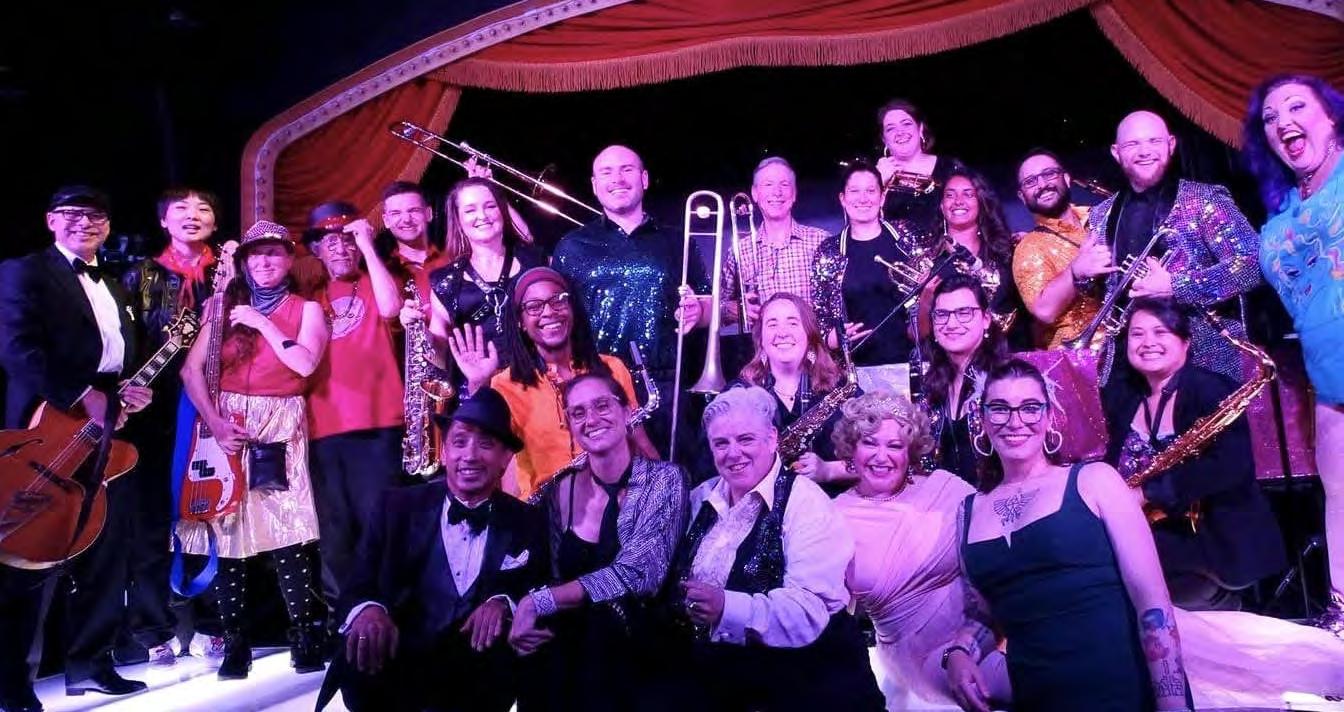
by David-Elijah Nahmod
It’s Leigh Crow month at Oasis, with the wellknown entertainer putting on two shows that promise to have the audience stomping their feet. On August 14 Crow, also known as Elvis Presley impersonator Elvis Herselvis, will co-host (with Zelda Koznofski) “Swingin’ Songbirds: A Big Band Cabaret,” in which she and her friends will perform sizzling songs from the Great American Songbook.
Then, on August 24, Crow invites you to put on your dancing shoes and to dress up in your best 1960s attire and help her celebrate her 60th birthday. There will be cocktails, live music, and there may even be a performance from the birthday girl herself.
Crow has been performing for decades. Besides her legendary run as Elvis Herselvis, she launched the ’60s cover band The Whoa Nellies, and the queer country band Velvetta. She has also performed extensively with the Sick and Twisted Players and Thrillpeddlers. Crow has also given other performers a platform upon which to be seen and heard with Dandy, her drag king cabaret. On top of all that, Crow has played Captain James T. Kirk in Oasis’ hilarious productions of “Star Trek Live.”
In an interview with the Bay Area Reporter, Crow spoke about both upcoming shows, paying tribute to some of her musical influences.
“I do love that kind of music,” she said of the “Big Band Cabaret.” “My parents were a little bit older and I grew up listening to jazz, not so much big bands but more jazz and a little jazzier jazz. I
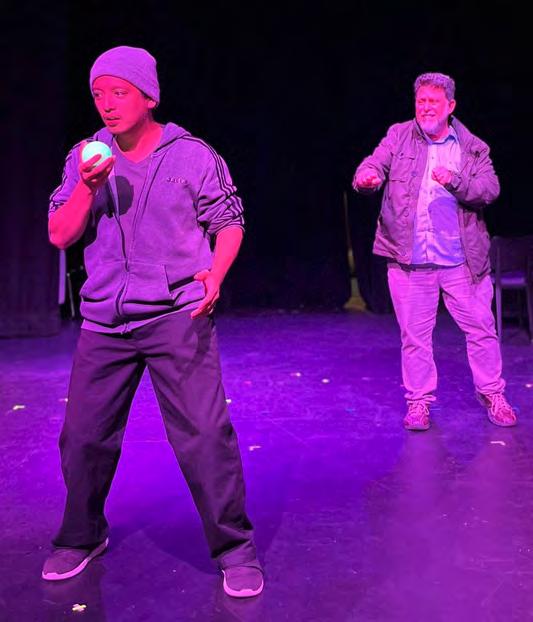
TFuture is Queer’
by Jim Gladstone
he stock in trade of Left Coast Theatre Company is anthology evenings of queercentric short plays. Their current two-hour program, at the Phoenix Theater through August 9, features seven clever pieces written in response to the thematic prompt, “The Future Is Queer.” This particular theme has inspired pieces featuring sassy androids, a disturbingly vivid virtual reality experience, a television dating show, an Orwellian dystopia, and more. Past productions have been built around notions of
found family, queer history, horror, and dating. But there are broader themes evident in all of Left Coast’s work: Creativity, community, and opportunity.
The company’s modus operandi, under executive director Erica Andracchio and artistic director Neil Higgins, is to promote open calls for scripts focused on a loosely defined notion; select the best submissions for a staged reading; then further develop, cast, and produce them in a full production during a future season.
After each open call is announced, Left Coast offers a writers’ workshop to encourage participation by fledgling playwrights. Many first-time
have a real appreciation of great vocalists, so that’s one of the things that attracts me to this. I have always responded to it, the strings and the vocalists, the harmony of the horns. I really enjoy it. It speaks to me.”
Crow doesn’t see it as much of a challenge to market a show like “Big Band Cabaret” to a modern audience, pointing out that current popular vocalists, such as Taylor Swift, Beyoncé, and especially Lady Gaga have an obvious appreciation for the vocalists of previous generations.
“Us gays, we love our female vocalists,” Crow said. Her own preference is for Eydie Gorme, a popular singer from decades ago.
“She actually started as a big band singer,” Crow pointed out. “Then she was hired to be on The Steve Allen Show and met her husband. Steve Lawrence. They became the quintessential
writers, actors, and directors have debuted under the company’s auspices alongside well-established professionals.
Short and smart
“The Future is Queer” offers brisk, prickly glimpses of technological perils and pleasures; takes on trans progress; and perspectives aging in the queer community. Even if you don’t particularly like a piece, it’s over in a flash, and still enriches post-show discussions of recurring motifs and concurring beliefs.
Brooklyn-based Grayson May’s mischievously meta “Gay Robot Play”; Bay Area playwright Mike Lawson’s wistful “Lavender Room,” featuring delightfully kvetchy comic turns by Scott Cox and Carl Lucania; and first-time playwright Ryan Mannequin’s “Nowadays,” all find older queers wondering if their 20th-century struggles and sacrifices will be appreciated and honored by future generations.
Bittersweet comedy “Pocket Universe” by Duncan Pflaster (whose full-length “The Underpants Godot” has been produced by Theatre Rhinoceros) and “Pushing the Button” by Casey Robson-Davis, both question the double-edged ease of access to life-changing tech. Both feature standout performances from actor Louel Señores.
Showcasing versatility
Señores, who quickly became one of the Bay
lounge couple. Yes, they got cheezy, but it was so great and so fun, but they also won Emmys for their tributes to Gershwin. They’re really underrated, and they happen to be my favorites. Her big band stuff is really fantastic.”
Sultry singing
Some of the other performers in the cabaret include Crow’s partner Ruby Vixen, who, as Crow puts it, will be singing a “sultry, sexy number,” and jazz vocalist Briana Scales, who brings quite a resumé to the table. Scales, a veteran of SF Jazz, has sung behind Aretha Franklin, Sweet Honey in the Rock, and Al Green. Members of the almost twenty-piece band will also get up and sing, and Crow promises a lot of glamour.
See page 12 >>
Area’s actors to keep an eye on with his breakout turn as a dishy queen in NCTC’s “To My Girls,” shifts between bro-style backslaps and romantic swish as the straight object of a co-worker’s gay fantasy in “Pocket Universe” and then takes on a third vivid comic persona –a glitchy, whirring service automaton– in “Pushing the Button.” He nails them all.
Puja Tolton effectively directs both the tender “Gay Robot Play” and the harrowing “Transitioners.” And Ciera Eis also does double directing duty, titrating just the right level of pathos into the primarily comic “Pocket Universe” and “Dyke TV.” Typical of Left Coast productions, “The Future is Queer” addresses knotty questions on a shoestring budget. That doesn’t stop lighting designer Curtis Overacre and sound designer Beth Cockrell from pulling off some surprisingly nifty effects, including deft punctuation of Señores’ character shifts in “Pocket Universe,” and an Orwellian aura throughout Al R. Niotta’s “Transitioners.”
Investing time and effort in up-and-coming performers, writers, and behind-the-scenes craftspeople, Left Coast Theatre Company makes an invaluable contribution to the future of Bay Area theater, queerly.t
‘The Future is Queer,’ through Aug. 9. $20$35. Phoenix Theater, 414 Mason St., 4th Floor. https://lctc-sf.org/
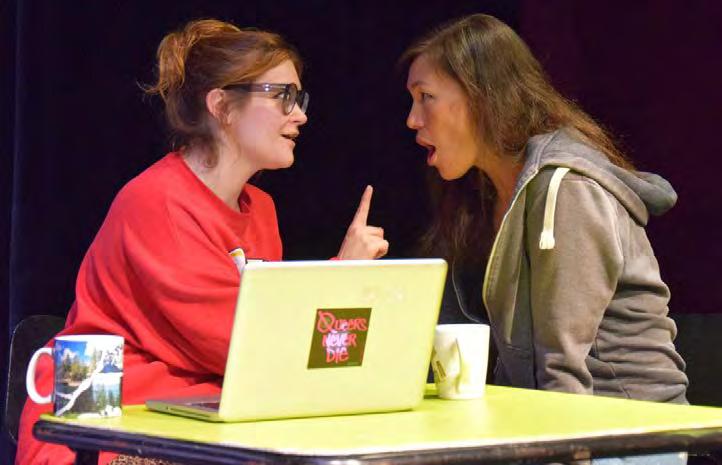
by Laura Moreno
The new three-part documentary film “Dear Ms.: A Revolution in Print” chronicles the rise of “Ms.” magazine and celebrates its influential cultural role through a mix of archival footage, candid interviews, and cultural commentary. The film is both a
nostalgic tribute as well as a sobering reflection on how far society still has to go.
The 110-minute documentary’s creative format unfolds like a magazine issue featuring a variety of topics. Its narrative is divided into three segments, each directed by a different director; Salima Koroma, Alice Gu, and Cecilia Aldarondo.

A jazzy musical score by Pamela Z gives the film just the right feel, tying it all together.
Koroma’s opening segment dives into the chaotic birth of the magazine in 1971. Gloria Steinem, Patricia Carbine, and a scrappy team of activists launched “Ms.” to speak directly to women’s lived experiences. The documentary’s use of footage of typewriters noisily clacking, and protest chants captures the feel of the era.
A striking scene recreates the editors debating headlines like “Raising Kids Without Sex Roles” for the first issue over stacks of coffeestained typed manuscripts.
In an interview with Gloria Steinem, age 91, she confesses, “We weren’t sure anyone would buy it, but we knew we had to try.”
The gamble paid off. An incredible 300,000 copies sold out in just a few days, signaling a hunger for feminist journalism in the country.
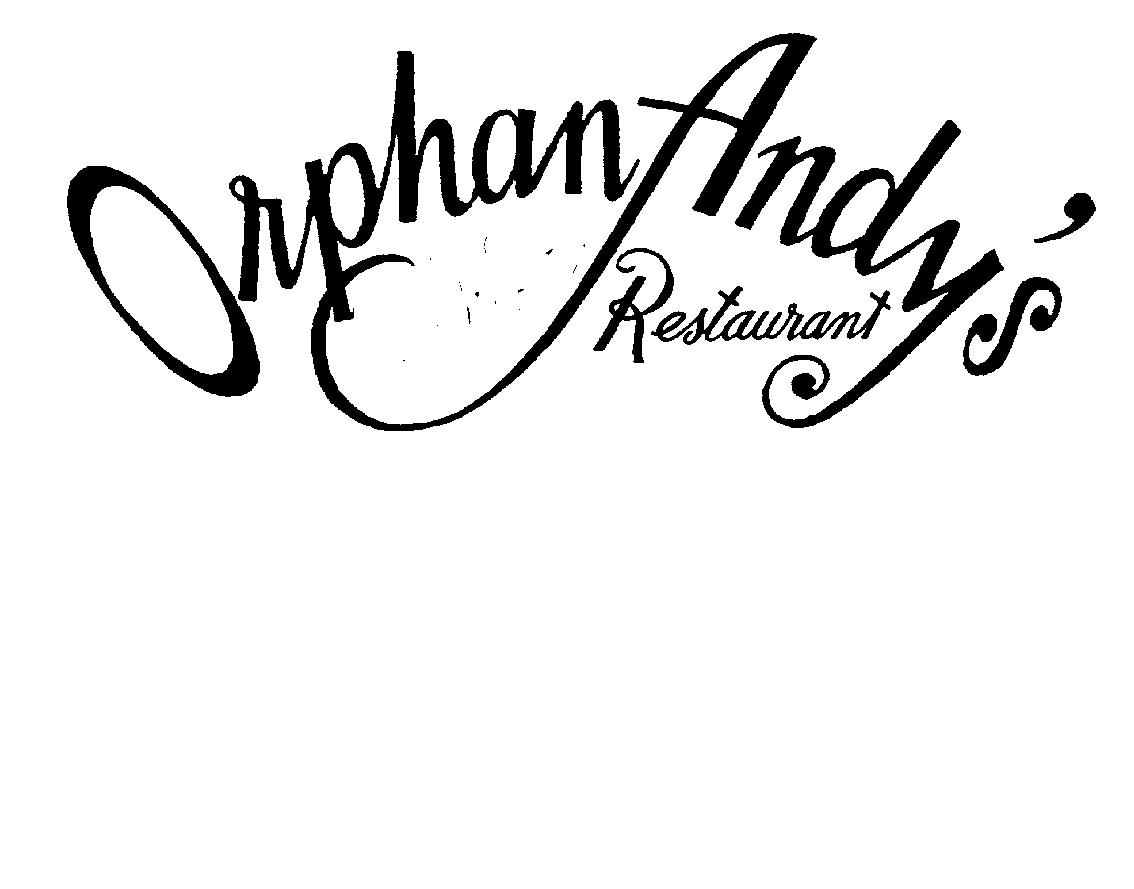

Cultural ripples
The second segment, directed by Gu, takes a closer look at the magazine’s impact on culture, particularly its role in mainstreaming issues like workplace discrimination and reproductive rights.
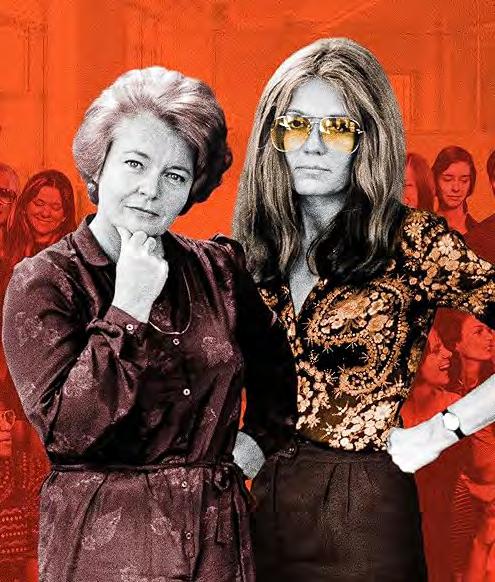




A 1975 “Ms.” article on domestic violence, for example, gave women the vocabulary to discuss the problem and be taken seriously for the first time, recalls contributor Barbara Smith.
Gu pairs these insights with dynamic visuals: bold cover art, reader letters, and clips of Steinem testifying before Congress. The segment demonstrates how “Ms.” bridges grassroots activism and mainstream media. Figures like bell hooks and Flo Kennedy were instrumental in accomplishing this.
At the same time, “Dear Ms.” doesn’t shy away from early critiques of the magazine’s initial struggle to reflect the diversity of its readership. The publication amplified white, middleclass voices at the expense of others.
Marcia Ann Gillespie, former “Essence” editor, offers a critique of “Ms.” magazine’s early blind spots regarding race and ethnicity, and Steinem reflects further on learning from these missteps. As Koroma notes in an interview, “We wanted to show the messiness of progress.”
Intrepid analysis
The final segment, directed by Aldarondo, is the film’s most analytical, introspective, and perhaps its most important segment going forward. Split-screen montages juxtapose “Ms.” magazine’s earnest editorials with protests from more forward-thinking feminists.
Critic Amy Taubin observed, “’Ms.’ proved words could shift culture, but they also exposed its fault lines.”
The film tackles controversial stances taken by the magazine, like its landmark 1980s antipornography campaign. Notably, the film recounts how aligning with figures like legal scholar Catharine MacKinnon alienated feminists who sought to bring the US in line with other industrial nations that safeguard the rights of all their citizens, including sex workers, to pay into and receive Social Security and full workers’ benefits. Government’s role is to hold every industry accountable, particularly those that are prone to abuse.
Interviews with former editor Letty Cottin Pogrebin and activists like the late lesbian poet Audre Lorde (via archival audio) help us understand how very important issues like this one were not well served by “Ms.” magazine.
“We didn’t always get it right,” Pogrebin said.
Today’s relevance
To be sure, the film draws parallels to today’s ongoing debates, such as gender equity, abortion, free speech, and intersectionality (the theory that racism, sexism, and classism intersect in the lives of marginalized people).
This approach resonates in today’s polarized climate.
The film also includes human interest stories, like that of a reader who found the courage to leave an abusive marriage after reading a “Ms.” magazine article.
“Ms.” gave women permission to demand more. Yet, it also questions whether the magazine’s model can inspire in today’s fragmented media landscape.
In the final analysis, “Dear Ms.: A Revolution in Print,” like many documentaries, at times feels uneven. Also, it does not address claims that the CIA funded “Ms.” magazine. Given Gloria Steinem’s previous CIA ties and the feminist group Redstockings’ 1975 claims that Ms. Magazine was influenced by CIA funding and/or networks, many viewers wonder why the film is silent on this question.
But “Dear Ms.” does strive to objectively evaluate its legacy, cognizant that the subject matter will be judged by history with the passing of time. Particularly for those who lived through the second wave of feminism, this documentary is a must-watch, a testament to the difficult, important work of progress.t
‘Dear Ms.: A Revolution in Print’ is now streaming on HBO Max. www.hbomax.com
by Brian Bromberger
The bar or bat mitzvah is the coming-of-age ritual in Judaism, where 13-year-old boys or girls are now accountable for who they are and their actions, not their parents. Author Eli Zuzovsky has expanded this definition and applied it to queer people in his scathing and audacious debut novel, “Mazeltov.”
Our hero, Adam Weizmann, is less concerned about learning and reciting Hebrew and worried more about his developing sexuality. He’s also a precocious, lonely, aspiring actor dealing with stage fright, as he prepares to star in an upcoming school play, having been goaded by his flamboyant theater instructor, Vee. As Zuzovsky will reveal, all these and other factors will compel anxious, self-doubting Adam to define his identity vis-à-vis his own costly version of manhood.
It’s Tel Aviv 2009 and Operation Cast Lead, or the first Gaza War, is


by Michele Karlsberg
My favorite part of Vinny Cusenza’s website is a section called Behind the Bio, where he answers a deceptively simple question: What’s the most unexpected thing that happened while writing “Blood and Soil?”
His answer; discovering that a Nazi Youth camp once operated not far from his childhood summer home, and then watching the resurgence of American fascism unfold in real time. That sense of uncovering buried truths –both personal and historical–runs deep in his powerful debut novel, a queer historical suspense set in midcentury Appalachia.
Cusenza is a Brooklyn native, a global traveler with a soft spot for Italy, and a seasoned freelance editor who brings a cross-genre sensibility to his writing. “Blood and Soil” is atmospheric and emotionally charged, blending romance and identity with the hard realities of racism, nationalism, and inherited bias.
In this interview, we talk about how setting becomes character, how silence can be survival, and how queer storytelling can be both reckoning and reclamation.
Michele Karlsberg: Blood and Soil is such a vivid title, with both historical and emotional weight. How did you come to choose it, and what does it signify in the context of the novel?
Vinny Cusenza: The book’s title evolved over time, and as the story’s layers of meaning revealed themselves to me, so did the right name for this project. We have three mutually distrustful communities occupying the same land, in an isolated swath of Appalachia. “Blood” conveys the racial and ethnic division and animus among these siloed groups, as well as the violence this intolerance leads to.
Shadowing all of this is a terrible secret that some locals are desperate to keep buried—their Nazi past right here, in America. What finally settled the title for me was knowing that “blood and soil” was a rallying cry in Hitler’s Germany.
The story takes place in midcentury Appalachia, a time and place rife with social tension. What drew you to that specific setting for a queer historical suspense novel?
From my own experience there, I knew that the inhabitants of this landscape could provide me with a richness and complexity of human experiences that would fuel the story: the dominant group: religious, white working class German Americans whom prosperity had left behind, and who also had suffered extreme persecution in America, which would have been in living memory at the time
<< Mazeltov
From page 10
he prepares, struggling with lust and shame, to come out to himself and his family. His entire world, including his relatives and the country, is in a mess. His journey isn’t presented linearly or consistently, but in a kaleidoscopic fashion with time blurring from past memories, then jumping into the future as Adam later prepares to leave mandatory military service. The chaotic bar mitzvah is the central event and we experience it not only through Adam and his interior monologues, but through the voices of his friends and family, with each chapter giving us a particular characterization with their own varying viewpoints, conveying biographical details about themselves and Adam.
Hilarious chapters include Adam’s first visit to a gay bar, then a stream-
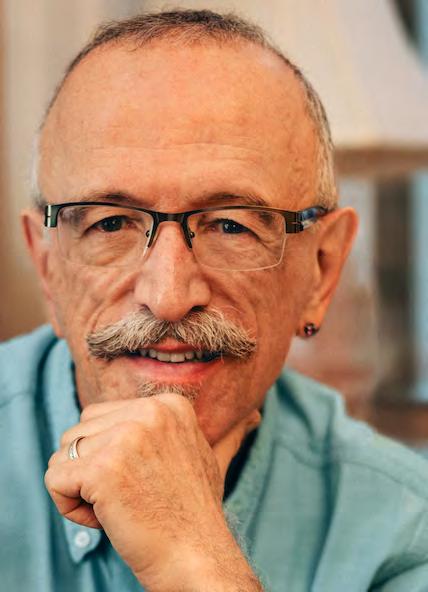
Buried truths in a new novel, ‘Blood and Soil’

of the novel; a tribe of multi-racial mountaineers of American Indian ancestry, who lived off the grid and out of site to stay out of trouble.
And finally, the new colonizers, boot-strapping immigrants from the city whose summer cottages in the mountains had cinched their American dream, but who lived apart from the other groups.
The setting itself became a character in its own right, by turn helping and hindering my characters. The sunlit mountains and lakes, the forests and iron mines, raging storms and treacherous whirlpools all augmented the danger, despair, hope, fear, and yearning of my characters and served the story.
The dynamic between Tony and Jake is central to the novel—equal parts tender and volatile. How did their relationship develop for you during the writing process?
My thought experiment was to give Tony and Jake lives with virtually no point of intersection, each of them with their own distinct flavors of self-loathing and bias, and give them a raw physical attraction. Then I added a generous portion of animus and violence in their mountain world, put both men in harm’s way, and stirred. After that, I stepped back and let each character find their way forward.
I knew their chemistry would be volatile, but it was less clear to me at the start how their attraction could cut through all of their differences. It turned out that being outsiders in more ways than gay was the key.
As a debut novelist, what personal or professional experiences most influenced this book, especially its themes of identity, silence, and inherited bias?
First and foremost, my journey from loathing myself at ten to being comfortable in my own skin at 28. In the 1960s, the only guidance I could find for how to be gay was:
of-consciousness review of when he first had sex with another man. Overall, the novel lacks coherence in that it reads like a series of interconnecting short stories that don’t quite gel into a single entire narrative.
Despite all the neurosis surrounding him, his childhood traumas, and social isolation, we come to admire Adam as probably the most grounded person in the book even with his agita about being gay. It’s as if his bar mitzvah is a jigsaw puzzle and he’s trying to figure out how to put all the interlocking pieces together to form the adult Adam.t
Read the full review on www.ebar.com.
‘Mazeltov: a novel’ by Eli Zuzovsky, Henry Holt and Company, $26.99 www.us.macmillan.com www.elizuzovsky.com
New York City. I had no POC friends until college. My views about nonwhite people were fed to me by the popular culture’s fabrications, distortions, and omissions. All of that was ripe for exploration in my writing.
The book has been described as “a twisty, atmospheric murder mystery” and also a “search for our authentic selves.” How did you balance suspense with deeper emotional and political storytelling?
to allow the suspense to arise from the emotional and political challenges which my characters grapple with.
Queer historical fiction can be both a reclamation and a reckoning. What responsibilities or freedoms did you feel in writing a story like this, one that centers gay love in a time of intolerance?
don’t. The Stonewall Riots happened just across town from me, but I was so closeted, they might as well have been on the moon. Also, I grew up in a white monoculture in my corner of
The suspense and the emotional and political aspects of the story were mutually reinforcing. I subscribe to the late writer Paul Monette’s belief, which I paraphrase here, when history’s lightening rod strikes you, then your art is political; you either embrace it, or run from it, but it must be dealt with when writing about the human condition. In our present age of strongmen, mendacity, and scapegoating, the emotional is political for LGBTQ people. My job as a writer is
Our community has spent the past sixty years or so uncovering our history, after a millennium of erasure. It’s very important to me to keep the memory of our gay past alive, to remind us that there is no final victory over oppression for queer people without constant vigilance, because once again, in real time, we are being erased.t
Read the full interview on www.ebar.com.
‘Blood and Soil,’ by Vinny Cusenza, $18.95 paperback, $8.99 Kindle, $22 audiobook, Pen & Pencil Press www.vinnycusenza.com

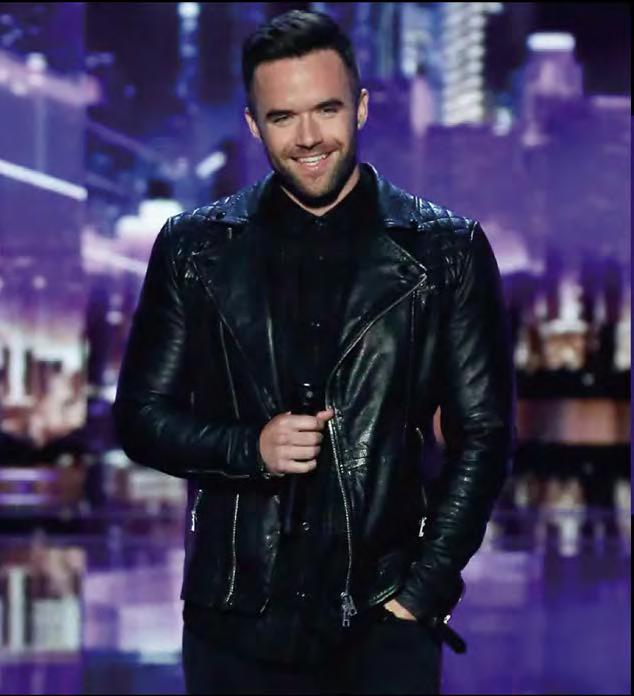


America’s Got Talent and American Idol Star Brian Justin Crum, a dynamic vocalist and singer-songwriter based in Los Angeles, is celebrated for his emotive performances and soaring vocal range. His debut single, Show Me Love, climbed to #2 on the Billboard Dance Charts and was ranked among the Top 10 dance records of 2017.


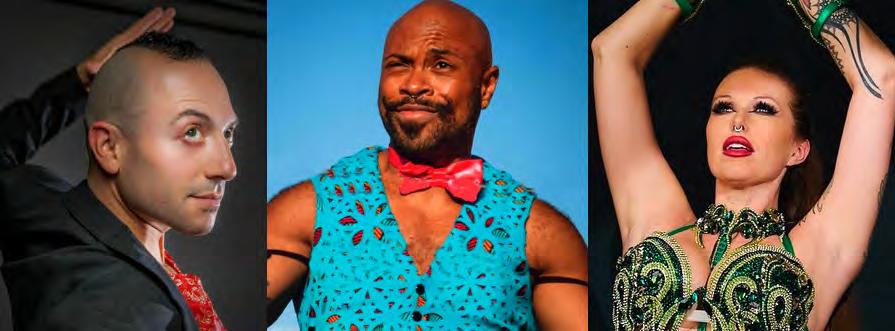
by Adam Sandel
‘RiseUp and Dance!’ is an international cabaret dance party that will benefit The LGBT Asylum Project on August 15 at Oasis. The goal is to support the queer immigrant community, as well as Team Oasis, both of which are facing a very challenging time.
The Colombian bombshell La Chichi (the gender-fluid alter ego of Juliano Wade) will lead this musical celebration of world cultures, along with flamenco dancer Damien Alvarez, strongman Toni Cannon, belly dancer Stefanie Schlief, acrobat Garrett Allen, and emcee Adam Sandel, with dance music by DJ Ion.
As co-producer of the event, this writer was knee-deep in preparing the
show when the shocking news hit that after eleven years as San Francisco’s premier queer nightclub, Oasis will be closing at the end of 2025.
Suddenly, the urgent needs of our queer immigrant community were joined by the needs of Team Oasis.
In an article in the Bay Area Reporter, Oasis owner D’Arcy Drollinger stressed how important it is for the community to attend Oasis events and shows, to help keep them afloat throughout the rest of the year.
“By closing the doors of the club, we’re opening up a world of new possibilities,” Drollinger stated.
A history of supporting queer causes As Founding Director of Fundrais-
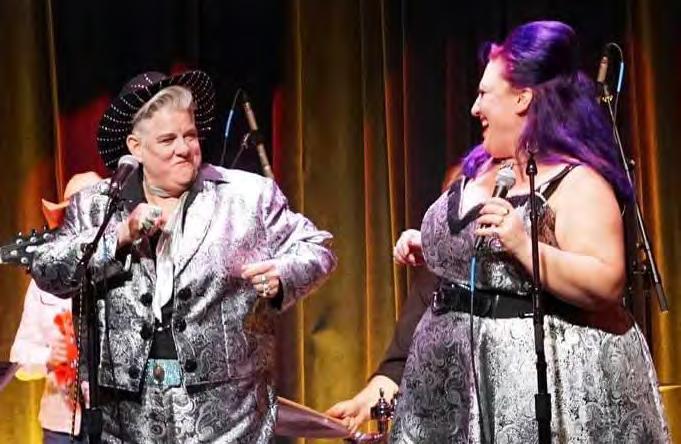
“I’ll be doing my tux drag,” she said. Crow also spoke about her upcoming birthday bash.
“I never thought I’d get here, but here I am,” she said. “But I’m feeling
great. When I look back, I’ve done so many things, including this, that were on my bucket list. So this is another great experience to have. As a performer it’s really exciting.”
She promises that the music in the birthday celebration will include a cornucopia of ’60s sounds, such

ing and Events for The LGBT Asylum Project, choosing Oasis as the site for our 2015 launch party was a no-brainer for me. Since then, the club has hosted many fundraisers for the organization, which provides legal services for LGBT immigrants who are seeking asylum in the United States.
When the 2016 presidential election ushered in aggressive attacks against immigrants and the queer community, we added the catchphrase “Now more than ever” to The LGBT Asylum Project materials. Support ballooned and the fundraisers multiplied.
Among the Asylum Project events hosted by Oasis was The Third Annual (and most grand) Mr. International Freedom Contest in 2018. One of the
as surf music. There will be a lot of drag, though Crow for the most part isn’t sure who will be there, except for Miss X, a veteran performer from the 1980s. Crow’s band Velvetta will be playing, performing some of the original songs they’ve written. Partygoers are encouraged to dress in 1960s attire.
“The ’60s was the era I was born in,” Crow said. “The visuals, the music, the era speaks to me, all the way from the ‘Mad Men’ ’60s to the hippie freak-out ’60s, and everywhere in between.”
Classic tunes
The B.A.R. also spoke to Bebecca Sharp, bandleader and sax player for the “Big Band Cabaret.”
“We have tunes from all over the American cultural landscape of the last century,” they said. “A few of them are ‘Summertime’ from the controversial 1935 opera ‘Porgy and Bess,’ and ‘Big Spender’ from the 1966 musical ‘Sweet Charity,’ made famous by the bombastic, fantastic, Shirley Bassey. A couple of tunes synonymous with Frank Sinatra like
first contestants in this international male beauty pageant was our Mr. Colombia, Juliano Wade.
An alter ego is born
A multi-talented dancer whose styles range from tribal fusion belly dance to West African, samba, Latin, jazz, heels, and boylesque, Wade fuses acrobatic moves with his dance performances using props such as swords, candles, fire, fans, ribbons and more.
The Colombian-born American citizen volunteered his time to perform at many Asylum Project fundraisers. When he approached me to help him develop a comically exotic gender-fluid character called La Chichi, I was all in.
Oasis was our first and only choice
‘Fly Me to the Moon’ and ‘Come Fly with Me.’ We are premiering an original tune by our keyboard player entitled ‘Streams,’ and we are going to perform one of my favorites, ‘Just a Gigolo/I Ain’t Got Nobody’ in the style of Louis Prima.’


for a venue to introduce this character, which we did in the 2023 show ‘Who the Hell is La Chichi? An evening of song, dance and mis-spoken word.’
The innumerable dance parties, drag shows, and film and TV parodies that Oasis has presented over the years have made it San Francisco’s premier queer-friendly nightclub. But to many of us, who’ve been dedicated to raising awareness and funds for an urgent cause (or have simply needed a place to launch an exotic alter ego), it has become so much more than that. t
‘Rise Up and Dance!’ $25-$200. Aug. 15, 9:30pm, at Oasis, 298 11th St. www.sfoasis.com www.lgbtasylumproject.org
Sharp addressed the challenges of marketing this show, as well as touching upon their feelings regarding Oasis’ impending closure, which the B.A.R. has reported.
“Marketing is a challenge, period,” they said. “Instrumental music, without a vocalist, is not very popular unless it comes with the cachet of the symphony. Our cabaret show is more engaging to the audience than our instrumental shows since we have great vocalists, entertaining emcees, and hosting it at Oasis is a draw in and of itself. We are bummed this is the last time we’ll be able to play there, but I know our community has too much creativity, energy and ideas to stay down even without a permanent home so I am looking forward to see what arises next.”t
‘Swingin’ Songbirds: a Big Band Cabaret,’ August 14, 7pm, $29.68. Leigh Crow’s Swinging 60th Birthday, August 24, 12pm, $17.40 Both shows at Oasis, 298 11th Street. www.sfoasis.com

